Related Research Articles

Petros Mavromichalis, also known as Petrobey, was a Greek general and politician who played a major role in the lead-up and during the Greek War of Independence. Before the war, he served as the Bey of Mani. His family had a long history of revolts against the Ottoman Empire, which ruled most of what is now Greece. His grandfather Georgios and his father Pierros were among the leaders of the Orlov Revolt.

Dimitrios Kallergis was a fighter of the Greek War of Independence, major general, politician and one of the most important protagonists of the 3 September 1843 Revolution.

The First National Assembly of Epidaurus was the first meeting of the Greek National Assembly, a national representative political gathering of the Greek revolutionaries.

Athanasios Miaoulis was a Greek military officer and Prime Minister of Greece. Born in Hydra in 1815, Miaoulis was the son of the famous Greek admiral Andreas Miaoulis, from whom he learned his navigation skills.
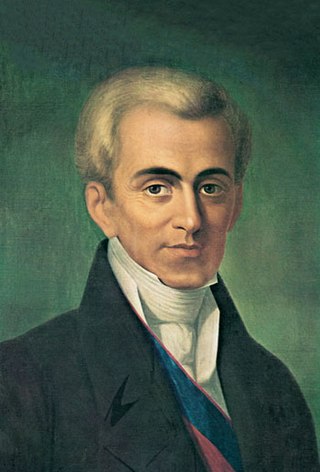
Count Ioannis Antonios Kapodistrias, sometimes anglicized as John Capodistrias, was a Greek statesman who was one of the most distinguished politicians and diplomats of 19th-century Europe.
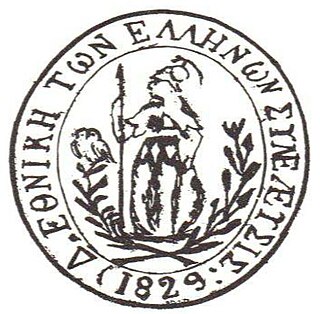
The Fourth National Assembly at Argos was a Greek convention which sat at Argos from 11 July to 6 August 1829, during the Greek War of Independence.
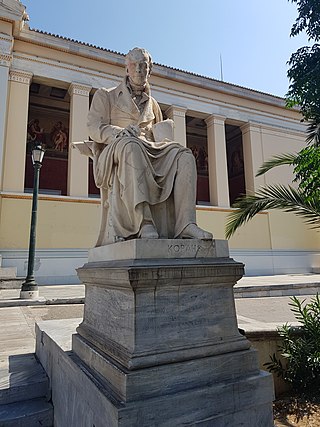
Ioannis Kossos was a Greek sculptor of the 19th century. Born in Tripoli, he later studied in Athens and Florence. His work includes several statues and busts in Athens, Patras and other Greek cities.

The London Protocol of 1830, also known as the Protocol of Independence in Greek historiography, was a treaty signed between France, Russia, and Great Britain on 3 February 1830. It was the first official international diplomatic act that recognized Greece as a fully sovereign and independent state, separate from the Ottoman Empire. The protocol afforded Greece the political, administrative, and commercial rights of an independent state, and defined the northern border of Greece from the mouth of the Achelous or Aspropotamos river to the mouth of the Spercheios river. As a result of the Greek War of Independence, which had broken out in 1821, the autonomy of Greece in one form or another had been recognized already since 1826, and a provisional Greek government under Governor Ioannis Kapodistrias existed, but the conditions of the Greek autonomy, its political status, and the borders of the new Greek state, were being debated between the Great Powers, the Greeks, and the Ottoman government.
Michail Komneinos Afentoulief or Afentoulis was a Greek who lived in Russia and served as an officer in the Imperial Russian Army. He is best known for his participation in the Greek Revolution and his activities on the island of Crete during the period 1822–23.
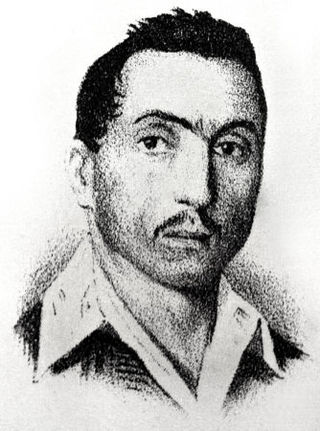
Christos Palaskas was a Greek chieftain during the Greek War of Independence. He was killed by Odysseas Androutsos’s men, during an internal conflict.
Konstantinos Rados was a Greek merchant and member of the Filiki Eteria, a secret organization whose purpose was to overthrow the Ottoman rule of Greece. He took part in the Greek War of Independence against the Ottomans and during the governance of Ioannis Kapodistrias he held important administrative positions.
Georgios Psyllas was a Greek scholar and politician, and editor during the Greek War of Independence of the newspaper Efimeris ton Athinon.
The Efimeris ton Athinon was the first newspaper that was published in Athens. The public announcement for the publication of the newspaper took place on 18 July 1824 and the first issue of the newspaper was released on 20 August. It was printed in Salamis where the ephors of Athens temporarily sent the press for fear of raids by the Ottoman garrison of Chalkis. The next sheet was printed normally in Athens on 6 September. 103 sheets were released the first year, until 30 October 1825 and 37 sheets were issued during the second year, with the last sheet on 15 April 1826, when its publication was abruptly stopped.
A new legislative body called the Senate was created in 1829 by the Fourth National Assembly at Argos, replacing the prior advisory body called the Panellinion which had been founded by Governor Ioannis Kapodistrias the previous year.
A number of different and competing administrations used the name Administrative Committee(Greek: Διοικητική Επιτροπή) throughout 1832, each claiming responsibility for a different part of Greece, all after the dissolution of the Administrative Committee of 1831 of Augustinos Kapodistrias, Theodoros Kolokotronis, and Ioannis Kolettis and before the installation of King Otto of Greece.

The French occupation of Thessaly took place in June 1917, during the First World War, as part of the Allied intervention in the Greek National Schism. The chief military clash of the occupation became known as the Battle of the Flag.
Ioannis Mazarakis-Ainian was a Greek army officer, politician, and historian.
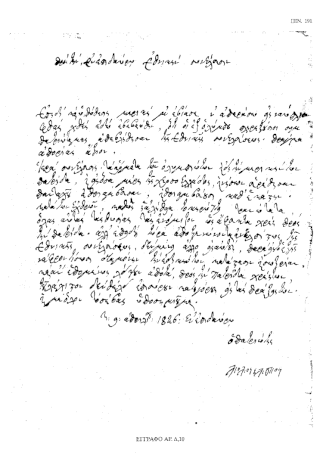
George Liolios Xirolivaditis or Xerolivadiotis was a Greek armatolos and fighter of the Greek Revolution in 1821 who lived from the late 18th century until the mid of the 19th century.

Ioannis Filimon was a 19th-century Greek historian, militant journalist, and publisher of the newspaper Aion for more than fifteen years, from 1838 to 1854. He also participated actively in the Greek Revolution of 1821.

Ilias Mavromichalis or Bezande-Ilias was a fighter of the Greek Revolution of 1821 and scion of the historic family of Mavromichali. He went down in history as the "Fairyborn" chieftain due to his beauty - which according to popular tradition he inherited from his grandmother.
References
- 1 2 3 Νεώτερον Εγκυκλοπαιδικόν Λεξικόν. Εγκυκλοπαιδικόν Λεξικόν Ηλίου (in Greek). Vol. Z'. Athens: Εγκυκλοπαιδική Επιθεωρήση «Ήλιος». p. 372.
- ↑ "Εθνοσυνέλευση Δ΄ (Άργος, 11 Ιουλίου – 6 Αυγούστου 1829)" (in Greek). 16 February 2009.
- ↑ Κωνσταντίνος Παπαρρηγόπουλος (1952). Μιχ. Γ. Πετρίδη (ed.). Επίτομος ιστορία του Ελληνικού έθνους περιλαμβάνουσα τα διδακτικώτερα πορίσματα της πεντατόμου ιστορίας του, συγχρονισθείσα γλωσσικώς υπό Μαν. Πρωτοψάλτη (in Greek). Athens: Δ. Δημητράκος Α.Ε. p. 843.
- ↑ "Εόρτια εκδήλωση προς τιμή των Υδραίων Γ.& Λ.Κουντουριώτη" (in Greek). Monastery of Kythera and Antikythera. Archived from the original on 3 August 2012. Retrieved 1 October 2015.
- 1 2 3 4 5 6 Χριστόπουλος, Γεώργιος (1975). Ιστορία του Ελληνικού Έθνους, Η ελληνική επανάσταση και η ίδρυση του εληνικού κράτους 1921-1832. Εκδοτική Αθηνών. p. 485. (αναφέρεται διάταγμα της 23 Ιανουρίου για τα πρώτα εννέα μέλη και διάταγμα της 3 Φεβρουαρίου για άλλα έξη και στις 29 Μαρτίου άλλοι έξη)
- ↑ "Τάτσης Μαγγίνας (Αναστάσιος) 1792-1880" (in Greek). Archived from the original on 2009-10-28. Retrieved 2015-10-01.
- ↑ "Ο γιατρός αγωνιστής Νικόλαος Μ. Ρενιέρης, Πρώτος Πρόεδρος της Βουλής των Ελλήνων" (in Greek). Materia Medica Greca. 1986. pp. 379–382.
- 1 2 "Μικρὸ ἀρχεῖο ἀγωνιστῶν τοῦ 1821" (in Greek).
- ↑ "Ράγκος Πάνος Πολιτικός Προεστός" (in Greek). Σύλλογος Αιτωοακαρνάνων Περιστερίου «Κοσμάς ο Αιτωλός». Archived from the original on 2012-08-04.
- ↑ Ι. Α. Βρετού (1911). "Σελίδες εκ της Ελληνικής Ιστορίας, Ο Κυβερνήτης Ιωάννης Καποδίστριας". Εγκυκλοπαιδικόν Ημερολόγιον 1912 (in Greek). Athens: Ιωάννης Δ. Κολλάρος: 61.
